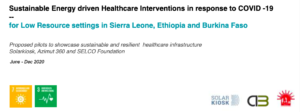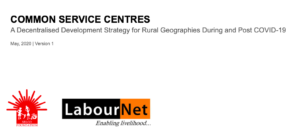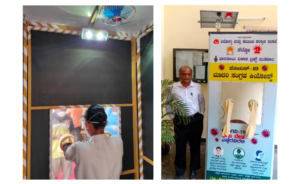Access to digital services- printing, photocopying, photo studios are integral for entities such as government offices, schools and colleges, financial institutions, local businesses etc. These services become critical in undertaking business transactions, maintaining records and for individual households in accessing bank and government schemes, subsidies and so on.
The Lok Sewa Kendra or LSK is a solar powered digital service center that gives a comprehensive set of solutions from a single photocopy machine to multiple systems. Some of these are co-located at the house of the entrepreneur, while others are located in village centers or within the premises of local government or educational institutions. A large percentage of them, implemented by SELCO Foundation or though the SELCO Foundation channels, are financed through bank loans that are being paid off by the entrepreneur through the increased income from the business.
The onset of COVID 19 and the subsequent lockdown imposed by the Indian government directly affected the business and income of these LSKs. However, a few LSK entrepreneurs managed to not only serve customers but also increase their income through certain coping mechanisms.
Solution Overview
The cases of two specific LSK entrepreneurs in Kalahandi- Subas Chandra Disari of Hirapur (in Jayapatna) and Haru Majhi of Dumerpadar (Thaumal Rampur) – are particularly interesting in terms of resilience and the value of decentralized energy systems and micro-energy entrepreneurship. Kalahandi district in Odisha is one of the poorest districts of the country, with a large population of tribal communities who have historically faced challenges of poor socio-economic development. In such a region, the effects of a lockdown such as the current one could strike a deathblow to many micro entrepreneurs, but these two entrepreneurs are finding ways to cope with the current crisis.
Diversification and reliability of services: The solar powered Lok Sewa Kendra afforded Subas Chandra Disari of Hirapur in Jaypatna, Kalahandi, an opportunity to add a banking kiosk of the State Bank of India (SBI) to his offerings at the center. Such banking kiosks require reliable energy services and digital systems allowing for easy withdrawal, deposits and other transactions for locals in the area. This is the only kiosk of this sort in the local village panchayat jurisdiction. As banking is considered an essential service, the kiosk was allowed to stay open during the lockdown and allowed Subas Disari to continue some aspects of his business. His typical monthly income prior to the lockdown was INR 10,000 per month. In April, he earned around INR 15,000 as his incentive from the bank for all the transactions undertaken through the banking kiosk.
than 12 kilometers to the nearest bank to withdraw cash for basic needs.





